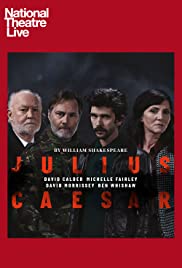
JULIUS CAESAR
UK, 2018, 120 minutes, Colour.
David Calder, Ben Whishaw, David Morrisey, Michelle Fairley, Adjoah Andoh.
Directed by Nicholas Hytner.
This is a film version of the production by the National Theatre, at the new Bridge Theatre, the play being staged in the round, the audience becoming participant in the play, especially for crowd scenes.
There is a prologue, a rock concert in the theatre, uniting the audience and their response. While this may have worked very well in reality, unless the audience is really tuned into rock ‘n’ roll, this 10 minutes is rather something of an ordeal – but redeemed by the fact that the players all move into the performance as significant characters.
The film has a very strong cast. It is set in the present day with contemporary dress. It also is rather multiracial in the selection of the cast, Asian background for Calpurnia, Octavius is black, as are some of the rock band and performers. There are several changes from male characters into female characters, most significantly Michelle Fairley as an excellent Cassius.
The principal men very strong. David Calder is an excellently arrogant Julius Caesar. Ben Whishaw, something of a whisp of a man, rises to strong stature as a scholarly Brutus. David Morrisey is a man of the people as Mark Anthony.
There is a very full use of the text and, with the cast, it is expertly spoken, clearly, the verse seeming natural rather than contrived, powerfully dramatic.
The theatre in the round is also used very effectively with the help of lighting, different parts of the stage, enabling wide sequences as well as movement. This is helped for the screen version by judicious use of close-ups and wider shots. This means that there is a powerful focus on the characters, their features, their body language as well as their speeches.
Swords are eliminated as weapons and there is a use of guns – with one verbal change from sword to bullet. There are quite substantial special effects, light and sound for the experience of war – and, if Shakespeare were watching today, he would possibly be very envious of these effects.
For those familiar with the play, they will be very satisfied with this performance. For those not familiar with the play, it serves as an excellent introduction.
The audience is immersed, despite the contemporary costumes, in the atmosphere of ancient Rome, the background of the power struggles, triumvirate, the role of Cicero, the role of Caesar and his foreign wars and conquests, his vanity, the offering of the crown by Mark Anthony and his seeming to refuse it. And, he is warned against the Ides of March. He is seen in triumph, warned by Calpurnia not to go to the Senate, his being persuaded by fellow senator to go. A red cloth is passed over the top of the audience indicating blood just before the assassination – by shooting. Caesar also has the opportunity to lie in state and appear as a ghost to Brutus before the battle of Philippi.
In the early part of the film are strong character is actually Cassius, hostile to Caesar and his ambitions, in earnest discussions with Brutus to persuade him to action. There is an introduction to the conspirators, especially Casca (an attention-grabbing performance by Adjoah Andoh). The audience is able to understand the ideology behind the coup against Caesar and his authoritarian ambitions.
Mark Anthony comes rather later into the play, friend of Caesar, popular, often with his accent becoming very much one with ordinary people. However, David Morrisey’s performance of the Friends, Romans, Countryman speech reminds audiences of how persuasive the speech is and its effect on the Roman people.
In some performances, the latter part of the play seems something of an anti-climax focused on Brutus and the sense of failure, his doubts, Cassius and self-assertion, the presence of Mark Anthony and Octavius and the imminent defeat of the conspirators. Ben Whishaw makes this part of the play quite vivid as does the appearance of Cassius, doubts, deaths, but Brutus is unable to kill himself but relying on the servant Lucius (who has provided some background as well as some comic touches earlier).
This version is a reminder of Shakespeare’s dramatic skills and the quality of Julius Caesar as a play.